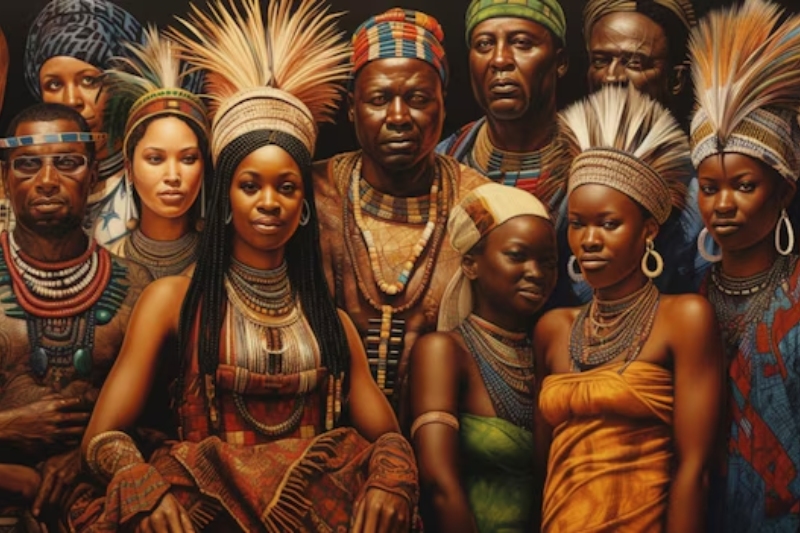From the mid-20th century forward, African theater—especially those south of the Sahara—fluttered in the postcolonial era. With colonial borders sometimes neglecting strong cultural and linguistic ties, the cultural and historical impacts across Africa are complex. African theater thus resists easy historical or national classification. Each enlivens the other as modern literary theater in English, French, and Portuguese, ancient celebrations, rites, and popular indigenous theater mix together. This page looks at significant sites and their contributions to African theater.
Anglophone Western Africa
Africa Ghana
Two of the most eminent female playwrights in Africa live in Ghana: Efua Sutherland and Ama Ata Aidoo. Writing in Akan and English, Sutherland’s works “Foriwa” (1962) and “Edufa” (1962) explore political concerns about independence. Inspired by traditional Ananse tales, her comedy “The Marriage of Anansewa” (1975) highlights her own anansegoro technique. Along with creating the Ghana Drama Studio in Accra, Sutherland penned children’s plays including “Vulture! Vulture!” and “Tahinta” (both 1968).
Significant contributions exploring issues of slavery and cultural identification come from Aidoo’s plays, “The Dilemma of a Ghost” (1965) and “Anowa” (1970). “Anowa” explores Ghanaian history and modern political temptations; “The Dilemma of a Ghost” explores the cultural issues a black American lady in Ghana faces.
Works by J.C. de Graft like “Sons and Daughters” (1964) and “Through a Film Darkly” (1970) examine home concerns and the collision of cultures during the independence era. Not least among his achievements were his adaptations of Shakespeare’s writings and his 1975 drama “Muntu.”
Other well-known Ghanaian playwrights whose works touch modern urban life and political concerns are Martin Owusu, Asiedu Yirenkyi, Kwesi Kay, and Mohammed Ben-Abdallah. Popular still today, Ghana’s Concert Party theater—known for its comedies and social satires—comfits the literary theater.
Nigerian
Rich cultural traditions shape Nigeria’s active and varied theater landscape. Yoruba opera and political and biblical dramas produced by playwrights including Hubert Ogunde, Duro Ladipo, and Kola Ogunmola were performed around the nation. Inspired by these artists, Nigerian dramatist and Nobel laureate Wole Soyinka created a spectrum of works between the late 1950s and the present. Among his significant pieces are “A Dance of the Forests” (1960), “The Trials of Brother Jero” (1960), and “Death and the King’s Horseman” (1975).
Another important person who examined the cultural scene of the Niger River delta in plays such as “Song of a Goat” (1964) and the “Bikoroa Plays” (1981) J.P. Clark-Bekedemero Especially remarkable is his version of the Ozid story.
Notable contributions also came from Zulu Sofola, the first female playwright from Nigeria, and Ola Rotimi, who reworked “Oedipus Rex” in “The Gods Are Not to Blame” (1968). Nigerian theater was much influenced by Rotimi’s historical dramas and creative theater techniques.
Radical theater exploded in the 1980s when playwrights like Bode Sowande, Olu Obafemi, and Femi Osofisan addressed political and social concerns using pidgin, a generally known language. As seen in “Once upon Four Robbers” (1978) and “Morountodun” (1982), Osofisan’s constant productivity and interaction with modern events confirmed his reputation as a top dramatist.
Sierra Leone’s
With major contributions from R. Sarif Easmon, Thomas Decker, and Yulisa Amadu Maddy, theater in Sierra Leone is concentrated on Freetown. The distinctive theatrical culture of Sierra Leone is highlighted by Decker’s Krio language adaptations of Shakespeare’s plays and Maddy’s inclusion of traditional performance aspects in plays such as “Big Berin” (1976).
Cameroon.
English-language theater from Cameroon features works by Sankie Maimo, Bole Butake, and others. Especially remarkable are Butake’s politically charged works, “The Rape of Michelle” (1984) and “Lake God” (1986).
Keep Reading
East African development
Kenyan
Preindependence theater in Kenya mirrored colonial tastes. But the fight for independence produced a potent protest theater. The main character is Ngugi wa Thiong’o, a famous novelist as well. Using militant song and dance, his plays “The Trial of Dedan Kimathi” (1976) and “Ngaahika Ndeenda” (1977), co-written with Ngugi wa Mirii, challenge colonial and neocolonial tyranny. Ngugi’s work is still powerful in spite of exile and censure. Other eminent writers whose satirical works challenge social concerns are Micere Githae Mugo, Kenneth Watene, and Francis Imbuga.
Affected by political, cultural, and historical elements, African theater is a dynamic and varied genre. African theater is a vivid and essential component of the world theater scene, thanks in great part to the confluence of traditional and modern forms, the mixing of indigenous languages with colonial ones, and the rich theme explorations.

